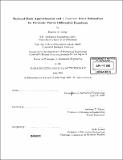Reduced-basis approximation a posteriori error estimation for parabolic partial differential equations
Author(s)
Grepl, Martin A. (Martin Alexander), 1974-
DownloadFull printable version (31.39Mb)
Other Contributors
Massachusetts Institute of Technology. Dept. of Mechanical Engineering.
Advisor
Anthony T. Patera.
Terms of use
Metadata
Show full item recordAbstract
Modern engineering problems often require accurate, reliable, and efficient evaluation of quantities of interest, evaluation of which demands the solution of a partial differential equation. We present in this thesis a technique for the prediction of outputs of interest of parabolic partial differential equations. The essential ingredients are: (i) rapidly convergent reduced-basis approximations - Galerkin projection onto a space WN spanned by solutions of the governing partial differential equation at N selected points in parameter-time space; (ii) a posteriori error estimation - relaxations of the error-residual equation that provide rigorous and sharp bounds for the error in specific outputs of interest: the error estimates serve a priori to construct our samples and a posteriori to confirm fidelity; and (iii) offline-online computional procedures - in the offline stage the reduced- basis approximation is generated; in the online stage, given a new parameter value, we calculate the reduced-basis output and associated error bound. The operation count for the online stage depends only on N (typically small) and the parametric complexity of the problem; the method is thus ideally suited for repeated, rapid, reliable evaluation of input-output relationships in the many-query or real-time contexts. We first consider parabolic problems with affine parameter dependence and subsequently extend these results to nonaffine and certain classes of nonlinear parabolic problems. (cont.) To this end, we introduce a collateral reduced-basis expansion for the nonaffine and nonlinear terms and employ an inexpensive interpolation procedure to calculate the coefficients for the function approximation - the approach permits an efficient offline-online computational decomposition even in the presence of nonaffine and highly nonlinear terms. Under certain restrictions on the function approximation, we also introduce rigorous a posteriori error estimators for nonaffine and nonlinear problems. Finally, we apply our methods to the solution of inverse and optimal control problems. While the efficient evaluation of the input-output relationship is essential for the real-time solution of these problems, the a posteriori error bounds let us pursue a robust parameter estimation procedure which takes into account the uncertainty due to measurement and reduced-basis modeling errors explicitly (and rigorously). We consider several examples: the nondestructive evaluation of delamination in fiber-reinforced concrete, the dispersion of pollutants in a rectangular domain, the self-ignition of a coal stockpile, and the control of welding quality. Numerical results illustrate the applicability of our methods in the many-query contexts of optimization, characterization, and control.
Description
Thesis (Ph. D.)--Massachusetts Institute of Technology, Dept. of Mechanical Engineering, 2005. Includes bibliographical references (p. 243-251).
Date issued
2005Department
Massachusetts Institute of Technology. Department of Mechanical EngineeringPublisher
Massachusetts Institute of Technology
Keywords
Mechanical Engineering.